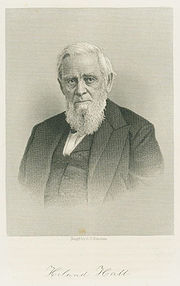Hiland Hall
Hiland Hall (born July 20, 1795 in Bennington , Vermont , † December 18, 1885 in Springfield , Massachusetts ) was an American lawyer and politician .
After attending school and studying law , Hall was inducted into the bar in 1819 and began practicing in his hometown of Bennington. He was politically active from 1827, when he was elected to the House of Representatives from Vermont . From 1828 to 1829 he was in Bennington County as chief of administration ( County clerk ) active; also in 1828 he was prosecutor in this county, which he remained until 1831.
In 1832, Hiland Hall was elected to the US House of Representatives for the National Republican Party , where he took the place of the late Jonathan Hunt . He was able to defend his seat four times, but during this time he switched from the dissolving National Republicans to the Whig Party . During his last term in office from 1841 to 1843 he was chairman of the Committee on Revolutionary Claims . In 1842 he did not stand for re-election.
Hiland Hall subsequently held various public offices. From 1843 to 1846 he worked as a state bank commissioner; he was then a judge at the Vermont Supreme Court until 1850 . From 1850 to 1851 he held a leading position in the US Treasury Department before he held the post of commissioner for public spaces in California until 1854 .
Hiland Hall , who had meanwhile switched to the Republicans , returned to active politics in 1858 when he was elected governor of his home state Vermont. After he resigned from this office in 1860, Hall, who was an opponent of slavery , participated in a peace covenant held in Washington in 1861 , which tried in vain to avert the civil war .
Web links
- Hiland Hall in the Biographical Directory of the United States Congress (English)
- Hiland Hall in the database of Find a Grave (English)
- Hiland Hall in the National Governors Association (English)
| personal data | |
|---|---|
| SURNAME | Hall, Hiland |
| BRIEF DESCRIPTION | American lawyer and politician |
| DATE OF BIRTH | July 20, 1795 |
| PLACE OF BIRTH | Bennington , Vermont |
| DATE OF DEATH | December 18, 1885 |
| Place of death | Springfield , Massachusetts |


